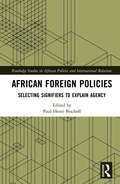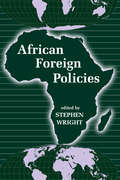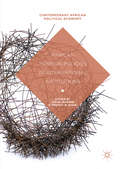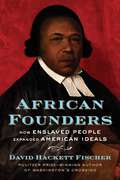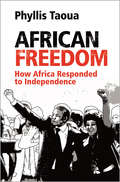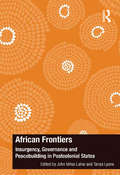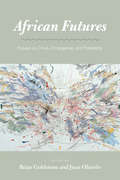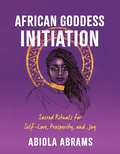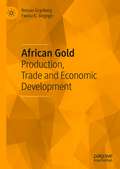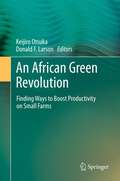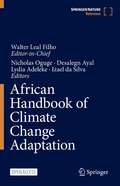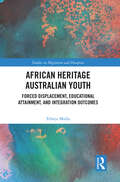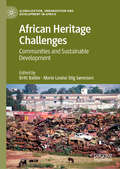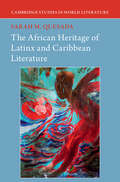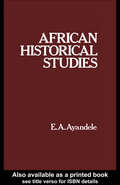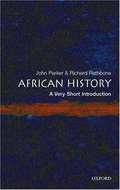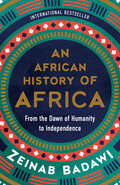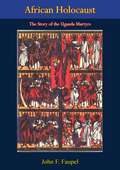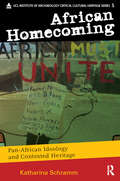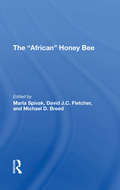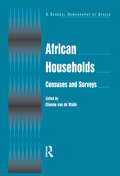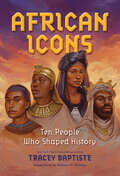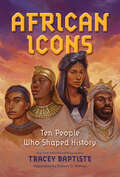- Table View
- List View
African Foreign Policies: Selecting Signifiers to Explain Agency (Routledge Studies in African Politics and International Relations)
by Paul-Henri BischoffThis book explores, at a time when several powers have become serious players on the continent, aspects of African agency, past and present, by African writers on foreign policy, representative of geography, language and state size. In the past, African foreign policy has largely been considered within the context of reactions to the international or global “external factor”. This groundbreaking book, however, looks at how foreign policy has been crafted and used in response not just to external, but also, mainly, domestic imperatives or (theoretical) signifiers. As such, it narrates individual and changing foreign policy orientations over time—and as far back as independence—with mainly African-based scholars who present their own constructs of what is a useful theoretical narrative regarding foreign policy on the continent—how theory is adapted to local circumstance or substituted for continentally based ontologies. The book therefore contends that the African experience carries valuable import for expanding general understandings of foreign policy in general. This book will be of key interest to scholars and students of Foreign Policy Analysis, Foreign Policy Studies, African International Relations/Politics/Studies, Diplomacy and more broadly to International Relations.
African Foreign Policies
by Stephen WrightThis volume of thirteen original essays provides a timely analysis of African foreign policies in a postCold War environment where African marginalization from the global economy appears to be increasing. Four thematic essays give an overview of critical changes occurring in African foreign policies, and ten country-by-country case studies provide specific analyses of decision-making, intraregional relations, and the struggles over policy with external agencies, including the World Bank and the International Monetary Fund. African Foreign Policies offers explanations for how African states are adapting to the international challenges of the late twentieth century. }Providing a timely analysis of the foreign policies of African states, this volume of original essays enables the reader to assess the position of African states within an evolving postCold War environment and to judge the extent of African marginalization from the global economy. As national foreign policies are increasingly influenced by factors such as regional organizations, democratization, external agencies like the World Bank and the International Monetary Fund, and the apparent weakening of state structures, there is need for fresh analysis of African foreign policies.The thirteen essays in this book, written by African, European, and North American scholars, provide comprehensive assessments of these issues in both analytical and prescriptive fashion. Three essays are thematic, considering broad areas of policy and change at the regional and continental levels; the other ten essays provide country-by-country case studies, drawing from a broad cross-section of countries in sub-Saharan Africa. Each essay analyzes factors such as decisionmaking, intraregional policies, and foreign policies toward non-African agents, including international financial institutions, and considers distinctions between formal and actual policies. As a whole, the volume seeks to explain how African countries foreign policies are adapting to new internal and international challenges in the fluid environment of the late twentieth century. }
African Foreign Policies in International Institutions (Contemporary African Political Economy )
by Jason Warner Timothy M. ShawGenerates conversations in the fields of postcolonial international relations; political, economic, and security studies; as well as informing the fields of foreign policy analysis and the study of international organizations. <P><P>This book is the first to exclusively consider the foreign policy tendencies of African states in international institutions. As an edited volume offering empirically based perspectives from a variety of scholars, this project disabuses the notion that Africa should be considered a "niche" interest in the field of foreign policy analysis. It asserts that the actions of the continent's states collectively serve as an important heuristic by which to interrogate and understand the foreign policies of other global states, and are not simply "anomalously" extant entities whose actions should be studied only insofar as they deviate from predictions based on the experiences of Western or other non-African states.
African Founders: How Enslaved People Expanded American Ideals
by David Hackett FischerIn this sweeping, foundational work, Pulitzer Prize–winning historian David Hackett Fischer draws on extensive research to show how enslaved Africans and their descendants enlarged American ideas of freedom in varying ways in different regions of the early United States.African Founders explores the little-known history of how enslaved people from different regions of Africa interacted with colonists of European origins to create new regional cultures in the colonial United States. The Africans brought with them linguistic skills, novel techniques of animal husbandry and farming, and generations-old ethical principles, among other attributes. This startling history reveals how much our country was shaped by these African influences in its early years, producing a new, distinctly American culture. Drawing on decades of research, some of it in western Africa, Fischer recreates the diverse regional life that shaped the early American republic. He shows that there were varieties of slavery in America and varieties of new American culture, from Puritan New England to Dutch New York, Quaker Pennsylvania, cavalier Virginia, coastal Carolina, and Louisiana and Texas. This landmark work of history will transform our understanding of America&’s origins.
African Freedom: How Africa Responded to Independence
by Phyllis TaouaThe push for independence in African nations was ultimately an incomplete process, with the people often left to wrestle with a partial, imperfect legacy. Rather than settle for liberation in name alone, the people engaged in an ongoing struggle for meaningful freedom. Phyllis Taoua shows how the idea of freedom in Africa today evolved from this complex history. With a pan-African, interdisciplinary approach, she synthesizes the most significant issues into a clear, compelling narrative. Tracing the evolution of a conversation about freedom since the 1960s, she defines three types and shows how they are interdependent. Taoua investigates their importance in key areas of narrative interest: the intimate self, gender identity, the nation, global capital, and the spiritual realm. Allowing us to hear the voices of African artists and activists, this compelling study makes sense of their struggle and the broad importance of the idea of freedom in contemporary African culture.
African Frontiers: Insurgency, Governance and Peacebuilding in Postcolonial States (The Ashgate Plus Series in International Relations and Politics)
by John Idriss Lahai Tanya LyonsThrough a multidisciplinary approach, African Frontiers counters the superficial, Eurocentric and gender insensitive dominant discursive representation of Africa within the discourse of war and conflict management, and security and peace/nation-building. The chapters historicize and theorize the realities in postcolonial African states, and the ramifications on the continents future. Situating the study within the context of the prevailing cultural and geo-political realities in the postcolonial African states, the chapters illustrate the complex ways in which events and processes are experienced at the local level, and how these local realities in turn impact and shape the patterns of political and military engagement in Africa and beyond. Organized along three major themes: Insurgency, governance and peacebuilding, expert researchers from around the world contribute chapters on: Rebel and insurgent formations such as the RUF, the LRA, and Boko Haram; state governance and corruption; terrorism and counter terrorism; security and peacebuilding; focussing on the tensions and challenges facing post-conflict societies such as Sierra Leone, Rwanda, and the newest nation-state on the continent, South Sudan. This highly significant and topical study problematizes the impact of wars on African nations, as well as the epistemological framing of the local realities and fallouts of armed conflict on post-colonial states.
African Futures: Essays on Crisis, Emergence, and Possibility
by Brian Goldstone Juan ObarrioCivil wars, corporate exploitation, AIDS, and Ebola—but also democracy, burgeoning cities, and unprecedented communication and mobility: the future of Africa has never been more uncertain. Indeed, that future is one of the most complex issues in contemporary anthropology, as evidenced by the incredible wealth of ideas offered in this landmark volume. A consortium comprised of some of the most important scholars of Africa today, this book surveys an intellectual landscape of opposed perspectives in order to think within the contradictions that characterize this central question: Where is Africa headed? The experts in this book address Africa’s future as it is embedded within various social and cultural forms emerging on the continent today: the reconfiguration of the urban, the efflorescence of signs and wonders and gospels of prosperity, the assorted techniques of legality and illegality, lotteries and Ponzi schemes, apocalyptic visions, a yearning for exile, and many other phenomena. Bringing together social, political, religious, and economic viewpoints, the book reveals not one but multiple prospects for the future of Africa. In doing so, it offers a pathbreaking model of pluralistic and open-ended thinking and a powerful tool for addressing the vexing uncertainties that underlie so many futures around the world.
African Genesis
by Sally C. Reynolds Andrew GallagherThe discovery of the first species of African hominin, Australopithecus africanus, from Taung, South Africa in 1924, launched the study of fossil man in Africa. New discoveries continue to confirm the importance of this region to our understanding of human evolution. Outlining major developments since Raymond Dart's description of the Taung skull and, in particular, the impact of the pioneering work of Phillip V. Tobias, this book will be a valuable companion for students and researchers of human origins. It presents a summary of the current state of palaeoanthropology, reviewing the ideas that are central to the field, and provides a perspective on how future developments will shape our knowledge about hominin emergence in Africa. A wide range of key themes are covered, from the earliest fossils from Chad and Kenya, to the origins of bipedalism and the debate about how and where modern humans evolved and dispersed across Africa.
African Goddess Initiation: Sacred Rituals for Self-Love, Prosperity, and Joy
by Abiola AbramsA sacred feminine initiation of self-love and soul care rituals, tools, and exercises.Spiritual teacher, intuitive coach, and award-winning author, Abiola Abrams invites you to activate African goddess magic to transmute your fears and limiting beliefs, so that you can create more happiness, abundance, and self-acceptance.Africa is a continent of 54+ countries, and her children are global. There is no one African spiritual tradition. Our ancestors who were trafficked in "The New World" hid the secrets of our orishas, abosom, lwas, álúsí, and god/desses behind saints, angels, and legendary characters. From South Africa to Egypt, Brazil to Haiti, Guyana to Louisiana, goddess wisdom still empowers us.Writes Abiola, "Spirit told me, "We choose who shows up." And if you are holding this book, then this sacred medicine is meant for you. In this book, you will meet ancient goddesses and divine feminine energy ancestors, legendary queens, and mystical spirits. As you complete their powerful rituals, and ascend through their temples, you will:. Awaken generational healing in the Temple of Ancestors;. Manifest your miracles in the Temple of Conjurers;. Release the struggle in the Temple of Warriors;. Embrace your dark goddess self in the Temple of Shadows;. Heal your primal wounds in the Temple of Lovers;. Liberate your voice in the Temple of Griots;. Open your third eye intuition in the Temple of Queens; and. Surrender, meditate, and rise in the Temple of High Priestesses.Welcome to your goddess circle!
African Gold: Production, Trade and Economic Development
by Roman Grynberg Fwasa K. SingogoThe book explores the evolving economics of gold as a global commodity as well as the production and trade of gold in and from the African continent. The growth of gold as an increasingly important and diverse source of African wealth is examined, alongside the impact that the rise of China in the 21st century has had on the demand for gold. The volatility of the gold price has increased as a result of the dramatic decline of gold demand for manufacturing purposes. Gold is Africa’s second largest export after oil and is a perfect metaphor for a continent rich in resources while so much of its population lives in such dire poverty. The artisanal and small scale gold mining (ASGM) sector, is surprisingly widely perceived as being beneficial to the development of Africa despite its exploitation and dreadful health and environmental consequences. African Gold: Production, Trade and Economic Development considers policy issues regarding the gold mining sector, the economics of beneficiation, the retreat of jewelry manufacturing across the continent as well as ‘Africa’s golden future’. It is a relevant book for both academics and policymakers interested in Africa, natural resource, and development economics.
An African Green Revolution: Finding Ways to Boost Productivity on Small Farms (Natural Resource Management and Policy #48)
by Keijiro Otsuka Donald F. LarsonThis volume explores the usefulness of the Asian model of agricultural development for Africa, where, even before the recent world food crisis, half the population lived on less than on dollar a day, and a staggering one in three people and one third of all children were undernourished. Africa has abundant natural resources; agriculture provides most of its jobs, a third of national income and a larger portion of total export earnings. However the levels of land and labor productivity rank among the worst in the world. The book explains Africa's productivity gap and proposes ways to close it, by examining recent experience in Africa and by drawing on lessons from Asia.
African Handbook of Climate Change Adaptation
by Nicholas Oguge Desalegn Ayal Lydia Adeleke Izael Da SilvaThis open access book discusses current thinking and presents the main issues and challenges associated with climate change in Africa. It introduces evidences from studies and projects which show how climate change adaptation is being - and may continue to be successfully implemented in African countries. Thanks to its scope and wide range of themes surrounding climate change, the ambition is that this book will be a lead publication on the topic, which may be regularly updated and hence capture further works.Climate change is a major global challenge. However, some geographical regions are more severly affected than others. One of these regions is the African continent. Due to a combination of unfavourable socio-economic and meteorological conditions, African countries are particularly vulnerable to climate change and its impacts. The recently released IPCC special report "Global Warming of 1.5º C" outlines the fact that keeping global warming by the level of 1.5º C is possible, but also suggested that an increase by 2º C could lead to crises with crops (agriculture fed by rain could drop by 50% in some African countries by 2020) and livestock production, could damage water supplies and pose an additonal threat to coastal areas. The 5th Assessment Report produced by IPCC predicts that wheat may disappear from Africa by 2080, and that maize— a staple—will fall significantly in southern Africa. Also, arid and semi-arid lands are likely to increase by up to 8%, with severe ramifications for livelihoods, poverty eradication and meeting the SDGs. Pursuing appropriate adaptation strategies is thus vital, in order to address the current and future challenges posed by a changing climate. It is against this background that the "African Handbook of Climate Change Adaptation" is being published. It contains papers prepared by scholars, representatives from social movements, practitioners and members of governmental agencies, undertaking research and/or executing climate change projects in Africa, and working with communities across the African continent. Encompassing over 100 contribtions from across Africa, it is the most comprehensive publication on climate change adaptation in Africa ever produced.
African Heritage Australian Youth: Forced Displacement, Educational Attainment, and Integration Outcomes (Studies in Migration and Diaspora)
by Tebeje MollaIn the last four decades, Australia has resettled thousands of African refugees. As a visibly different minoritised group, Black African youth are often represented as disengaged, dangerous, and undesirable. Even so, rarely are generative mechanisms that negatively affect the life-courses of the youth critically examined. Drawing on a wide range of theoretical resources, policy reviews, longitudinal statistical data, and in-depth interviews, this book reports on the educational attainment and integration outcomes of African heritage Australian youth from refugee backgrounds. The book also identifies intersectional factors of educational disadvantage, analyses equity provisions, and outlines policy ideas for improved educational attainment and integration of refugee youth. It is unique in its scope and focus and contributes to knowledge in African Australian studies.The book will appeal to researchers, postgraduate students, and policymakers interested in understanding the dynamics of refugee resettlement and integration.
African Heritage Challenges: Communities and Sustainable Development (Globalization, Urbanization and Development in Africa)
by Britt Baillie Marie Louise Stig SørensenThe richness of Africa’s heritage at times stands in stark contrast to the economic, health, political and societal challenges faced. Development is essential but in what forms? For whom? Following whose agendas? At what costs? This book explores how heritage can promote, secure, or undermine sustainable development with special focus on sub-Saharan Africa, and in turn, how this affects conceptions of heritage. The chapters in this volume identify shared challenges, good practices and failures, and use specific case studies to provide detailed insights into varied forms of heritage and heritage defining processes on the continent. By critically analysing the often romanticised discourses of ‘heritage’, ‘community engagement’, and ‘sustainable development’ the volume suggests ways of harnessing aspects of heritage to tackle some of the socio-economic and political pressures facing heritage practices on the continent, including the legacies of colonialism.
The African Heritage of Latinx and Caribbean Literature (Cambridge Studies in World Literature)
by Sarah QuesadaThe African Heritage of Latinx and Caribbean Literature unearths a buried African archive within widely-read Latinx writers of the last fifty years. It challenges dominant narratives in World Literature and transatlantic studies that ignore Africa's impact in broader Latin American culture. Sarah Quesada argues that these canonical works evoke textual memorials of African memory. She shows how the African Atlantic haunts modern Latinx and Caribbean writing, and examines the disavowal or distortion of the African subject in the constructions of national, racial, sexual, and spiritual Latinx identity. Quesada shows how themes such as the 19th century 'scramble for Africa,' the decolonizing wars, Black internationalism, and the neoliberal turn are embedded in key narratives. Drawing from multilingual archives about West and Central Africa, she examines how the legacies of colonial French, Iberian, British and U.S. Imperialisms have impacted on the relationships between African and Latinx identities. This is the first book-length project to address the African colonial and imperial inheritance of Latinx literature.
African Historical Studies
by E. A. AyandeleFirst Published in 1979. Routledge is an imprint of Taylor & Francis, an informa company.
African History: A Very Short Introduction
by John Parker Richard RathboneThis Very Short Introduction looks at Africa's past and reflects on the changing ways it has been imagined and represented, both in Africa and beyond. The author illustrates important aspects of Africa's history with a range of fascinating historical examples, drawn from over 5 millennia across this vast continent. The multitude of topics that the reader will learn about in this succinct work include the unity and diversity of African cultures, slavery, religion, colonial conquest, the diaspora, and the importance of history in understanding contemporary Africa. The book examines questions such as: Who invented the idea of "Africa"? How is African history pieced together, given such a lack of documentary evidence? How did Africa interact with the world 1,000 years ago? Africa has been known as 'the cradle of mankind', and its recoverable history stretches back to the Pharaohs. But the idea of studying African history is itself new, and the authors show why it is still contested and controversial. This VSI, the first concise work of its kind, will prove essential reading for anyone interested in the African continent and the diversity of human history.
An African History of Africa: From the Dawn of Humanity to Independence
by Zeinab BadawiAlready a major international bestseller, Zeinab Badawi’s sweeping and much-needed survey of African history traces the continent’s extraordinary legacy from prehistory to the present from the African perspective.“Equal parts gripping and galvanizing. . . . Researched across more than 30 countries, it brings the dazzling civilizations of pre-colonial Africa vividly to life. A book that feels both long-overdue—and wholly worth the wait.” —British VogueEveryone is originally from Africa, and this book is therefore for everyone.For too long, Africa’s history has been dominated by western narratives of slavery and colonialism, or simply ignored. Now, Zeinab Badawi sets the record straight.In this fascinating book, Badawi guides us through Africa’s spectacular history—from the very origins of our species, through ancient civilizations and medieval empires with remarkable queens and kings, to the miseries of conquest and the elation of independence. Visiting more than thirty African countries to interview countless historians, anthropologists, archaeologists and local storytellers, she unearths buried histories from across the continent and gives Africa its rightful place in our global story.The result is a gripping new account of Africa: an epic, sweeping history of the oldest inhabited continent on the planet, told through the voices of Africans themselves.
African History through Sources
by Nancy J. JacobsAfrican History through Sources recounts the history of colonial Africa through more than 100 primary sources produced by a variety of actors: ordinary men and women, the educated elite, and colonial officials. Including official documents, as well as interviews, memoirs, lyrics, and photographs, the book balances coverage of the state and economy with attention to daily life, family life, and cultural change. Entries are drawn from all around sub-Saharan Africa, and many have been translated into English for the first time. Introductions to each source and chapter provide context and identify themes. African History through Sources allows readers to analyze change, understand perspectives, and imagine everyday life during an extraordinary time.
African Holocaust: The Story of the Uganda Martyrs
by John F. FaupelAfrican Holocaust, which was first published in 1962, tells the extraordinary story of how and why a group of 22 Catholic converts to Christianity in the historical kingdom of Buganda (now part of Uganda) were executed between 31 January 1885 and 27 January 1887. These “Uganda Martyrs” were killed on orders of Mwanga II, the Kabaka (King) of Buganda, at a time of a three-way religious struggle for political influence at the Buganda royal court. The episode also occurred against the backdrop of the “Scramble for Africa”—the invasion, occupation, division, colonization and annexation of African territory by European powers.A fascinating read.
African Homecoming: Pan-African Ideology and Contested Heritage (UCL Institute of Archaeology Critical Cultural Heritage Series)
by Katharina SchrammAfrican Americans and others in the African diaspora have increasingly “come home” to Africa to visit the sites at which their ancestors were enslaved and shipped. In this nuanced analysis of homecoming, Katharina Schramm analyzes how a shared rhetoric of the (Pan-)African family is produced among African hosts and Diasporan returnees and at the same time contested in practice. She examines the varying interpretations and appropriations of significant sites (e.g. the slave forts), events (e.g. Emancipation Day) and discourses (e.g. repatriation) in Ghana to highlight these dynamics. From this, she develops her notions of diaspora, home, homecoming, memory and identity that reflect the complexity and multiple reverberations of these cultural encounters beyond the sphere of roots tourism.
The african Honey Bee
by Marla Spivak David J Fletcher Michael D BreedThis book is the first review of the scientific literature on the Africanized honey bee. The African subspecies Apis mellifera scutellata (formerly adansonii) was introduced into South America in 1956 with the intent of cross-breeding it with other subspecies of bees already present in Brazil to obtain a honey bee better adapted to tropical conditions. Shortly after its introduction, some of the African stock became established in the feral population around Sao Paulo, Brazil, and spread rapidly through Brazil. It has since migrated through most of the neotropics, displacing and/or hybridizing with the previously imported subspecies of honey bees. Africanized bees have been stereotype d as having high rates of swarming and absconding, rapid colony growth, and fierce defensivebehavior. As they have spread through the neotropics they have interacted with the human population, disrupting apiculture and urban activities when high levels of defensive behavior are expressed.
African Households: Censuses and Surveys
by Etienne Van WalleThis volume in the ?General Demography of Africa? series encompasses many nations and focuses on a feature of the censuses ? household relationships. African households rank among the most complex in the world. This work makes it possible to investigate relationships among individuals within the household and relate them to household characteristics such as structure and headship. In addition to discussing household composition in comparative terms, the book pays special attention to the place of women in the household, and to the residence of children and the aged. The analyses use micro-data from a variety of countries including Botswana, Burkina Faso, Cameroon, Cote d?Ivoire, the Gambia, Senegal, Kenya and the Republic of South Africa.
African Icons: Ten People Who Shaped History
by Tracey BaptisteAuthor Tracey Baptiste takes readers on a journey across Africa to meet some of the great leaders and thinkers whose vision built a continent and shaped the world. Black history begins thousands of years ago with the many cultures and people of the African continent. Through portraits of ten heroic figures — from Menes, the first ruler to be called Pharaoh, to Queen Idia, a sixteenth-century power broker, visionary, and diplomat — this rich and thrilling nonfiction text goes back many millennia to introduce readers to the underrepresented stories of Black history and Black excellence. Illustrator Hillary D. Wilson’s brilliant portraits accompany each profile, along with vivid, information-filled landscapes, maps, and graphics for readers to pore over and return to again and again. Key Text Features map maps author's note chapters facts further information further reading headsings historical context historical note foreword illustrations illustrator's notes introduction labels photographs references resources table of contents Correlates to the Common Core State Standards in English Language Arts: CCSS.ELA-LITERACY.RI.5.3 Explain the relationships or interactions between two or more individuals, events, ideas, or concepts in a historical, scientific, or technical text based on specific information in the text. CCSS.ELA-LITERACY.RI.6.3 Analyze in detail how a key individual, event, or idea is introduced, illustrated, and elaborated in a text (e.g., through examples or anecdotes). CCSS.ELA-LITERACY.RI.6.6 Determine an author's point of view or purpose in a text and explain how it is conveyed in the text.
African Icons: Ten People Who Shaped History
by Tracey BaptisteIn this expansive collection of history, meet ten real-life kings, queens, inventors, scholars, and visionaries who lived in Africa thousands of years ago and changed the world. Black history begins thousands of years ago with the many cultures and people of the African continent. Through portraits of ten heroic figures, bestselling author Tracey Baptiste takes readers on an empowering, energetic journey through time to meet some of the great leaders and thinkers whose vision built nations and shaped the course of history: Menes: Creator of Dynasties Merneith: A Queen Erased Imhotep: From Peasant to God Aesop: The Wisest Man in the Ancient World Hannibal Barca: Unparalleled Military Strategist Terence: North African Playwright Amanirenas: Warrior, Diplomat, Queen Tin Hinan: Founder of a City on the Dunes Mansa Musa: The Richest Man of All Time Queen Idia: Kingmaker Illustrator Hillary D. Wilson's brilliant portraits accompany each profile, along with vivid, information-filled landscapes, maps, and graphics for readers to pore over and return to again and again. This rich and thrilling work, which celebrates Black excellence and provides an essential correction to Eurocentric tellings of history, will enthrall readers of all ages. &“In African Icons, Baptiste engages in the hard work of unveiling the myths about the African continent to young readers . . . This is a great beginner&’s guide to pre-colonial Africa.&” —Ibram X. Kendi, National Book Award-winning author of Stamped from the Beginning and How to Be an Antiracist
